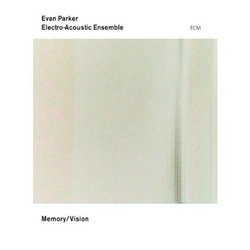| All Artists: Evan Parker, Electro-Acoustic Ensemble Title: Memory/Vision Members Wishing: 2 Total Copies: 0 Label: Ecm Import Release Date: 5/11/2004 Album Type: Import Genres: Jazz, Special Interest, Pop Styles: Avant Garde & Free Jazz, Experimental Music Number of Discs: 1 SwapaCD Credits: 1 UPCs: 044003811720, 0044003811720, 044003811720 |
Search - Evan Parker, Electro-Acoustic Ensemble :: Memory/Vision
CD Details |
CD ReviewsA sprawling live recording R. Hutchinson | a world ruled by fossil fuels and fossil minds | 08/05/2004 (4 out of 5 stars) "MEMORY/VISION is the third recording of Evan Parker's Electro-Acoustic Ensemble. Seventy minutes of continuous music recorded live at the Ultima Festival in Oslo in October, 2002, MEMORY/VISION was performed by an incarnation of the Ensemble that adds Joel Ryan on computer and Agusti Fernandez on piano for a group of nine. The original EAE on TOWARD THE MARGINS (ECM/1997 -- see my review) was a sextet of Evan Parker/sax, Barry Guy/bass, Paul Lytton/percussion, Phil Wachsmann/violin and electronics, and Walter Prati and Marco Vecchi on electronics. DRAWN INWARD(ECM/1999 -- see my review) added Lawrence Casserly on electronics. Uniquely, the electronics of the EAE includes real-time processing of the acoustic instruments. When done masterfully, this synthesis of the acoustic and electronic is sublime in an alien sort of way. The addition of piano and greater use of the violin gives this live recording a more classical feel than the earlier albums, but only, of course in terms of timbre -- it by no means sounds like classical chamber music. The studio albums had twelve and eleven compositions, respectively, and each was distinctive and compact. The main problem, it seems, with this long live piece is that there are too many transitions where the intensity is lost. If you have heard the earlier recordings and enjoyed them, this is a fine continuation of the project. But if you haven't, my recommendation is to listen to one of the studio recordings first -- they are both more dense and powerful, and more consistently fascinating, than MEMORY/VISION." Hard To Rate This Dimension David Conklin | Albuquerque, NM USA | 03/05/2007 (4 out of 5 stars) "This is a continuous 70 minute live performance with saxophone, violin, bass, and drums (the acoustic part), altered in a very weird way using computerized sound processing (the electro part). The piece was apparently inspired by the life and work of mathematician Charles Arthur Muses, who must have come up with one heck of a theory about Time. The piece does suggest a real sense of time, its flow, etc.
After a few initial listens, I figured I'd probably end up trading this one in. It sat on the shelf for several months until I played it again yesterday. I'm still not quite sure what to make of it, but have at least decided to hang on to it. My previous reservation was basically that I'd prefer to spend my time listening to the actual sound of real instruments, rather than these semi-artificial, high-tech sounds. But this work is so darn intriguing that I find my mind bending a little (time-warp, perhaps). I don't find a lack of intensity (see previous reviewer) to be a problem, but then I haven't heard the earlier CDs. This seems to have just about the right level of intensity for me. Open-minded listeners should certainly give it a try. " |

